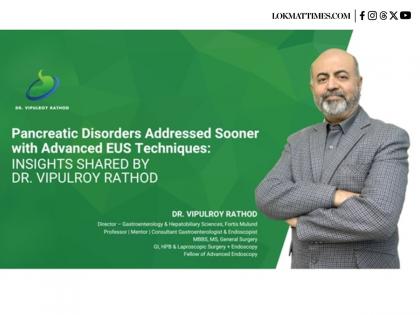Advanced EUS-Based Techniques Enhance Early Detection and Treatment of Pancreatic Disorders
By Impact Desk | Updated: June 24, 2025 18:33 IST2025-06-24T18:32:56+5:302025-06-24T18:33:20+5:30
Dr. Vipulroy Rathod, a leading expert in Endoscopic Ultrasound (EUS), has revolutionized the way pancreatic disorders are diagnosed and ...

Advanced EUS-Based Techniques Enhance Early Detection and Treatment of Pancreatic Disorders
Dr. Vipulroy Rathod, a leading expert in Endoscopic Ultrasound (EUS), has revolutionized the way pancreatic disorders are diagnosed and treated in Mumbai, India. With over 30 years of experience and more than 80,000 procedures, including 20,000+ EUS procedures, Dr. Rathod is recognized for pioneering cutting-edge techniques that provide early detection and minimally invasive treatment options for complex gastrointestinal conditions like pancreatic cancer, pancreatitis, and pancreatic cysts. His innovative approach has significantly improved patient outcomes, providing more precise diagnoses and faster recovery times compared to traditional methods.
As a trusted Endoscopist in Mumbai, India, Dr. Vipulroy Rathod has built a reputation for his expertise in EUS-based diagnostics and his commitment to early intervention in pancreatic health. EUS has proven to be a critical tool in detecting pancreatic conditions that are difficult to identify with other imaging techniques, such as CT scans or MRIs. Early detection can lead to timely treatments, reducing the need for invasive surgery and improving survival rates. According to the American Cancer Society (ACS), the 5-year survival rate for early-stage pancreatic cancer is estimated at around 30%, significantly higher than the general survival rate for all stages, which is approximately 10%. This statistic underscores the critical importance of early detection.
Dr. Rathod emphasizes the importance of early screening for pancreatic cancer, one of the most deadly cancers worldwide. Pancreatic cancer is ranked as the third leading cause of cancer-related deaths globally, and it is projected to become the second leading cause by 2030 due to its increasing prevalence. With EUS, doctors can detect pancreatic tumors and lesions as small as 1 cm, enabling earlier and more effective treatment options. “Early detection through EUS allows us to intervene before conditions become advanced, leading to more successful outcomes. Pancreatic disorders can progress silently, which is why proactive screening is essential,” says Dr. Rathod. “With EUS, we can pinpoint abnormalities that might be invisible to other imaging methods, providing our patients with better chances of recovery.”
In a recent case, a 40-year-old female was referred to Dr. Rathod after experiencing unexplained weight loss, persistent nausea, and back pain. Her primary care physician initially suspected a gastrointestinal infection, but her symptoms persisted. After a thorough evaluation using EUS, Dr. Rathod detected a small pancreatic lesion that was otherwise undetectable by traditional imaging. The patient underwent early treatment, preventing the tumor from growing and spreading. Thanks to early detection and swift intervention, she is now recovering well. Minimally invasive techniques like EUS are a part of Dr. Rathod’s broader approach to pancreatic care. He ensures precise diagnostics and the most effective treatments, using the latest technology, including linear and radial EUS, elastography, and contrast-enhanced imaging. Dr. Rathod is also skilled in performing ERCP (Endoscopic Retrograde Cholangiopancreatography) for managing bile duct obstructions and pancreatic conditions that require surgical intervention.
Dr. Rathod’s approach extends beyond advanced diagnostic techniques to include personalized treatment plans for each patient. Each patient’s health condition is thoroughly assessed, followed by tailored interventions that may involve dietary changes, pharmacological treatments, or endoscopic procedures, depending on the severity and type of the condition. Dr. Rathod’s extensive experience—having trained over 2,000 gastroenterologists from numerous countries—combined with his commitment to cutting-edge technology, has earned him global recognition. His leadership extends to his role as the founder of Endoscopy Guru, the world’s largest online library for advanced endoscopy training, which has helped educate countless professionals in minimally invasive endoscopic techniques. “The power of education and early intervention cannot be overstated. We’re not only diagnosing and treating, but we’re empowering the next generation of gastroenterologists to deliver the best care possible,” adds Dr. Rathod. With gastrointestinal disorders affecting a significant portion of the Indian population, Dr. Rathod’s dedication to early detection and advanced treatments has never been more vital. Many chronic conditions, including GERD, IBS, peptic ulcers, and cirrhosis, are poorly managed due to delayed diagnoses. EUS and advanced endoscopy are key tools in addressing these issues early, improving patient health outcomes significantly. For those experiencing digestive discomfort, unexplained symptoms, or pancreatic concerns, early consultation with a specialist is essential. Dr. Rathod’s clinic provides prompt evaluations, second opinions, and advanced diagnostics that can make a life-saving difference.
Dr. Vipulroy Rathod
Gastroenterology Institute, 5th Floor, Fortis Hospital, Goregaon-Mulund Link Rd, Nahur West, Industrial Area, Bhandup West, Mumbai, Maharashtra 400078
Open in app